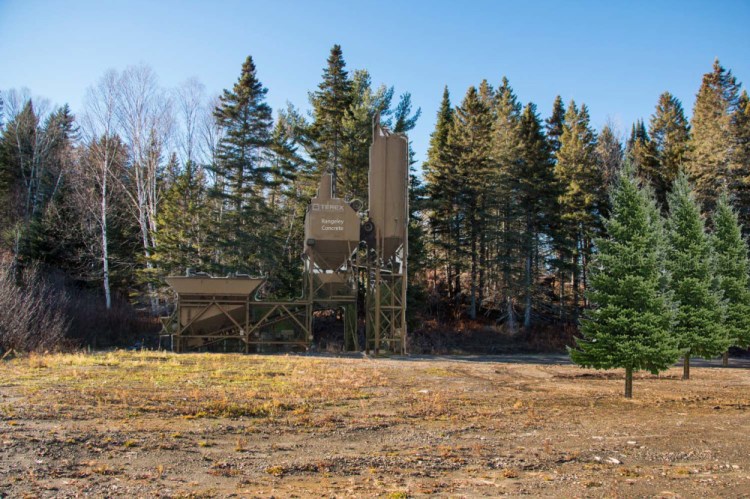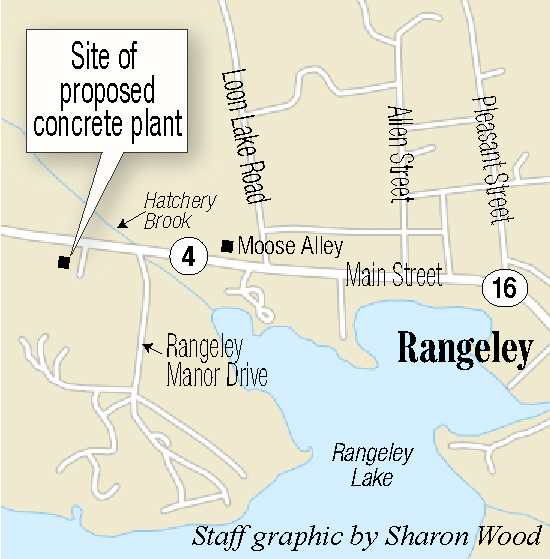RANGELEY — A controversial concrete batch plant proposal has cleared the latest in a series of a hurdles now that the Rangeley Zoning Board of Appeals has upheld its earlier finding that the facility would be permitted under the town’s zoning ordinance.
The board heard arguments Wednesday night from attorneys representing opponents to the plan and M&H Construction, the company proposing the plant, in a meeting that lasted nearly three hours. Ultimately, board members unanimously reaffirmed their Feb. 28 ruling.
The plan now will return to the town’s Planning Board for consideration and has been added to the board’s agenda for Wednesday, code enforcement officer Tom Lillis said Thursday.
At issue in the hearing was whether the proposed plant qualifies under the town’s light or heavy industrial use zoning ordinances. Heavy industrial use is prohibited in Rangeley.
Attorneys for the plan’s opponents argued that Maine courts have found previously that concrete production involved the processing of raw and extracted materials would fall under Rangeley’s definition for heavy industrial use.
“It makes no difference if you’re crushing rock someplace else and it’s smaller bits of rock,” said attorney David Lourie, referring to M&H’s argument that in using crushed rock, the plant is combining only finished materials. “The law court said in fact that doesn’t change its nature. It’s still raw material.”
The attorneys also argued that the board needed to find that Robert Folsom, the town’s former code enforcement officer, was not only clearly wrong when he found the plant qualified as heavy industrial, but that no reasonable person would have come to the same conclusion.
“The question before the board is not whether the three of you think that the use in question is light industrial,” said attorney Ted Small, who represented another set of a opponents. “The question is whether in reaching a different conclusion the code enforcement officer was just unreasonable.”
In fact, Folsom initially ruled the plant fell under light industrial use, but reversed his finding following input from the town’s attorney. M&H appealed Folsom’s finding to the appeals board, which ruled in its favor in February. Opponents of the plan quickly filed petitions to the board to reconsider that ruling.
The board’s ruling marks the latest victory for M&H Construction and follows a special town meeting last month in which residents resoundingly voted against a proposed six-month moratorium on industrial projects in Rangeley. The moratorium was proposed to allow time to revise the town’s zoning ordinance to ensure it aligns with the 2012 comprehensive plan.
Before the vote, town attorney Stephen Langsdorf framed the moratorium as an opportunity for Rangeley voters to indicate clearly whether the concrete plant or similar projects were welcome in their town. Langsdorf warned residents that without that clarification, the issue probably would be resolved in the courts.
Plant opponents have raised concerns about its effect on local water sources and air quality. Residents living near the proposed site also worry about noise levels at the plant and from concrete trucks. Both groups have said locating the plant off Route 4, part of the Rangeley Lakes National Scenic Byway, could hurt tourism to the area.
After a Dec. 14 public hearing on the proposed plant, M&H Construction, the company behind the project, offered a series of concessions to address residents concerns. The company has offered to rinse and wash trucks at an alternate location to prevent potential runoff to Hatchery Brook and Rangeley Lake. They also offered to plant trees to block views of the plant from Route 4, shift the start of business from 6 a.m. to 7 a.m. and grade the property to capture runoff in a sediment pond. Kenneth Haley, general manager at M&H Construction, said some elements of the plant would use electric motors, which would cut down on noise and emissions.
Haley said the company also performed tests to measure potential noise levels at the plant. In those tests, they found the diesel-run front-end loader registered at 65 decibels near the entrance to Rangeley Manor Drive, or the approximate equivalent of a vacuum cleaner. Traffic on Route 4 averaged about 76 decibels, Haley said.
Regarding concerns about water use, Haley said based on the current proposal, the plant would not draw from the local aquifer and instead would take water from Rangeley Lake and store it in a 4,000-gallon surge tank mounted on a Mack truck. The truck then would pump water into waiting cement trucks. Haley projected the plant would use a maximum of 4,900 gallons a week.
The Planning Board will consider M&H’s proposed concessions next week when it decides whether and under what circumstances to grant the plant a conditional use permit. The board still may request further changes before issuing the permit.
Plant opponents declined to discuss their next steps after Wednesday’s meeting. Any future appeals would follow the Planning Board’s ruling, town attorney Kristin Collins said.
Kate McCormick — 861-9218
kmccormick@centralmaine.com
Twitter: @KateRMcCormick
Send questions/comments to the editors.





Comments are no longer available on this story